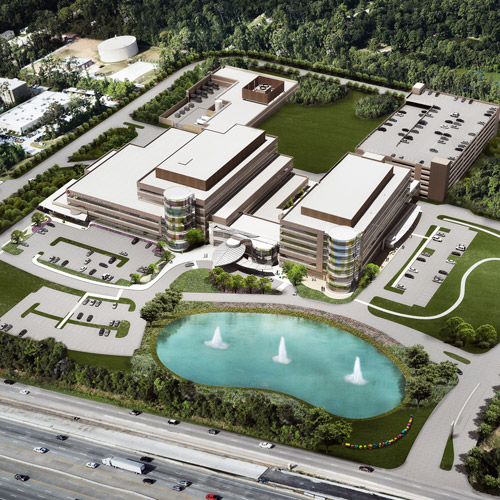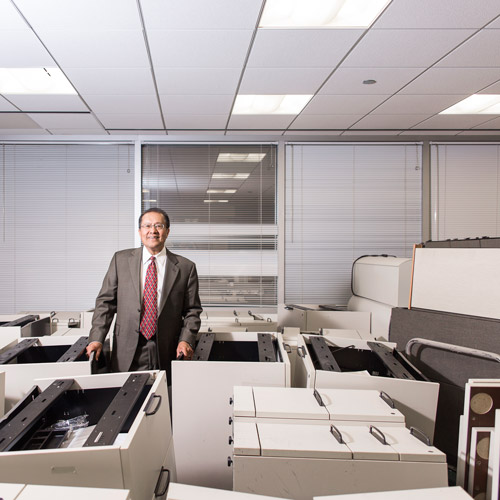It’s safe to assume Versa Development principals Steve Robinson, Todd Wyett, and Greg Erne view themselves with a touch of self-awareness. Spend a minute on the company’s website and you’ll find a cleverly posed shot of the triumvirate in pressed Oxfords peeking out from behind tall reeds, very aware of the camera in what is presumably the untrammeled landscape of a future development venture. One can almost see the shining city on the hill in the gleam of Robinson’s eyes.
Although Versa’s enterprising principals may project a casual, lighthearted image to potential clients, they take real estate—and the due diligence and risk calculation behind it—very seriously.
The trio does this by leveraging their combined experience in civil engineering, construction, land entitlement, and site and financial analysis with a preferred development program that pairs Versa with national brand retailers such as Starbucks, Qdoba, SportClips, and Panda Express.
All three gentlemen spoke to American Builders Quarterly about their development approach and what it means to southeastern Michigan that the company is growing both state- and nationwide.

Take us back to Detroit, circa 2008, when you launched. Can you describe the extent of the property vacancy and price declines you were seeing at the time?
Erne: What we were seeing was chaos in financial markets with respect to investors and lenders. That gave us the opportunity to find decent assets that needed a little elbow grease: repetitions with a quick turnaround to lease up, and capital in the $1–10 million price range. That appealed to me. We could execute a deal, manage it, and not have all our eggs in one basket. We could move quickly on distressed property deals with investors and lenders.
Exactly what sort of real estate opportunities were you seeing back then?
Wyett: We had national tenants looking to do more retail in Michigan, but at the time, banks were not lending in America and, in particular, Michigan. Our advantage was we didn’t have a lot of leverage on our balance sheet and could buy land cheaply—at 25 percent equity—and grow in a tight lending market. Some of our first deals came as result of older families that were willing to sell assets at a losing value. They were nervous and wanted get out while they could.
What distinguishes Versa from other development companies?
Erne: About two and a half years ago, we did a package deal. A group of foreclosures managed by a receiver were bundled together. We purchased them as a group with the goal of putting up capital and refinancing or selling them: a commercial building, medical office, and flex-office. The thinking was, “Let’s build three bridges, instead of one.” We worked with the receiver to handpick the assets. Dividing the properties this way was effective and added an element of creativity to the process.
And in other projects, like Pittsfield Place and a repositioned Comerica Tower near your Southfield headquarters, you’ve worked to tailor your approach to the specific needs of the community, balancing aesthetic qualities with economic imperatives. How did you strike this balance?
Robinson: What we really do to distinguish ourselves is listen to what the community wants and needs, and then design each project with those desires in mind. Whether it comes through in landscape architecture, building style, or materials, our eye-level design philosophy blends what the community is looking for with the function tenants require. We always balance those two needs and, more importantly, our clients know they can trust us to get it done as promised.
How do you go about choosing sites for retail or office development?
Robinson: If the tenant wants it, it’s a good site.
Erne: Right. [Laughter] When we look at acquisition of property, whether in Michigan or not, we look for good long-term prospects—high density and a proven development. We’d rather be in a market that is proven and pay a little more than be on the wrong side of the tracks. When flight from density occurs, we’re not afraid of seeking tertiary markets, but we’re selective. We like to own for the long-term. We underwrite to 15 percent vacancy, and strive for 85–95 percent occupancy on most large projects. We’re conservative in underwriting and we beat our assumptions. We don’t try to do more than the market can bear.
So how have you been so effective in attracting and retaining your tenants? What’s your secret?
Erne: We do a deep dive into all aspects of the property and market. It doesn’t take a ton of time, but you have to ask the right questions. Can we do something someone else hasn’t been able to do? Maybe out-of-state owners didn’t understand zoning. Maybe previous ownership lacked appropriate capital for maintenance or got deal fatigue and took too long to lease. A lot of it boils down to experience. We all have pretty well-established digestive systems for real estate. If our stomachs hurt, we know something isn’t working. And tenancy is key. If there are other tenants, occupants can tolerate certain inadequacies because they know there are surrounded by tenants driving sales.
What does it means to the greater Detroit metropolitan area that Versa is there and growing?
Erne: I think that our success in southeastern Michigan, and Michigan overall, where most of our properties are, shows the state has good strong markets within it. We’ve picked out the best markets in the state, like Oakland and Washtenaw Counties, and Grand Rapids. We all have such deeply entrenched experiences, and we do well because we are pretty well educated in the industry. But our success is also a testament to the strength and health of the economy. Michigan, as a state, is very strong, and we see sustainable growth ahead of us. We’re very bullish on the state of Michigan, if you’re in the right market.
The Origins of Versa Development
Starting a company in Detroit during the throes of the economic recession isn’t a typical beginning to a success story, but that’s where it began for Versa Development.
In 2008, Steve Robinson, the son of a Detroit-area builder, was a civil engineer who had successfully applied his construction management training from Michigan Technological University to make a name for himself in the residential development business. He received recognition from Crain’s Detroit Business in 2006 as one of the publication’s “40 Under 40” notable young business leaders. He understood building. He understood investment. He wanted more. He put together a plan to expand on his talents, and grow in the commercial real estate business.
That plan was put in motion when Robinson met Todd Wyett, who brought a corporate development background to bolster Robinson’s technical expertise and expand his reach. As former general counsel for Arbor Drugs, Inc., a publicly held chain of more than 230 stores acquired by CVS in 1998 for $1.5 billion, Wyett understood land and infrastructure development from a strategic, legal perspective.
“I met Steve doing a deal,” he says. “He sold me some dirt, and we decided to form Versa.”
Their first deal together was the acquisition of a regional shopping mall—a gutsy move others might have cowed at during a time of mass foreclosures and disinvestment in southeastern Michigan. Nevertheless, neither Robinson nor Wyett balked.
“Under the heading, ‘There has never been a famous general in a time of peace,’ we were looking to take advantage of opportunities that presented themselves in the [then] current economic climate,” Robinson says.
Greg Erne, founder of Beverly Hills, Michigan-based HELM Realty Partners, had never met Robinson, but he had done deals with Wyett. Erne had an appetite for larger acquisitions—multimillion-dollar retail centers, health clinics, and expansive office developments. Beyond that, he had relationships with the brokerage community and a diversified asset portfolio to help Versa broaden its ambitions.
“Both companies were growing and it was a good mix of partners,” Erne says. “We thought it made sense to pool our resources and brain power to grow it all together.”


